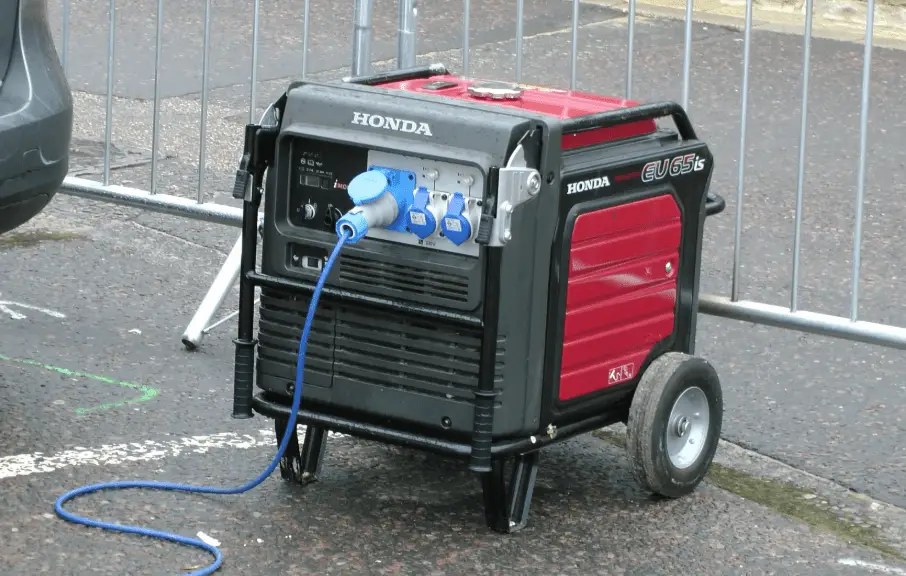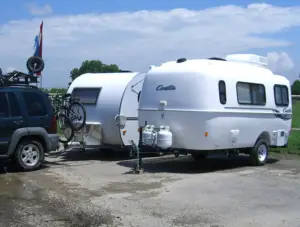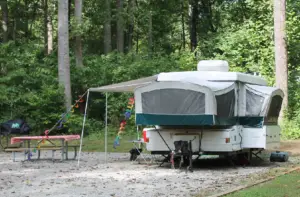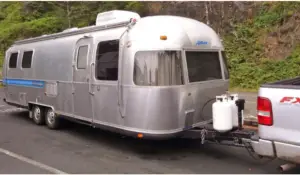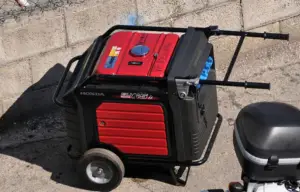RV Camping is fun as long as you don’t come across issues like no power or no water. While at campsite, mostly you would get electric supply but during dry camping; generators come handy.
A generator in RV can be in-built or has to be bought separately for your RV.
A quite generator can make your life easy during camping. If you are new to camping and RVing, then its important to understand the use of generator in RV and what all different options you get.
Generator use in RV
A generator is an important equipment for your RV if you are dry camping or boondocking.
When the electric hookup connection is not available for RV, generator provides AC power for all the appliances that need 120 Volt for operation. Generator can also charge and store power inside RV’s DC battery for later use.
A generator in RV provides power for your electronic/electrical appliances like Air conditioner, television, microwave, refrigerator, furnace, hair dryer and others. Some RV appliances run on DC power which is sourced from the RV’s DC battery.
Some RV’s are equipped with built-in generator. In absence of such a onboard generator, you also have an option of using small, less expensive portable generator.
A generator is a must in campsites that don’t have electricity supply.
At times, RVers think that they may not need the generator at all and take the power for granted. But, it is only when the supply is not there at the campsite that they regret not having a generator.
A battery can only last so long and does not provide as an alternative to generator, especially if you camp deep close to nature. An inverter can convert the DC to AC but running bigger appliances for longer duration may not be possible. Its not a better option when you can have a portable generator as an option.
Solar : Solar is also an option when you don’t have electric hookup. Solar panels are used to store the power in a DC battery. Using solar panels is a popular way of harnessing solar energy, but it comes with lots of limitations.
You have these other electricity alternatives as well but generator is the best option to have. They come in smaller sizes and you can always afford them at competitive rates.
Type of Generators for RV
There are 3 main type of generators that are available for RV use. These includes Gas, Diesel and propane. Each of these have their pros and cons. Lets have a look at these in detail.
Diesel Generator
Diesel generators burns the least fuel and they can take around 1.5 gallons of diesel per hour for a 20,000 watts generator. It is normally seen that diesel generators do pretty well and they also last longer.
They are more powerful and are preferred by people who use diesel powered engine for RV.
If your RV is a diesel run then it makes sense to get a diesel generator.
Gas Generator
Some people prefer gasoline fueled generators because it is easily available and affordable, but it burns faster and hence consumption is more.
Its also not a clean fuel for the environment. Gas is highly flammable and therefore you need to be more careful while dealing with it.
Propane Generator
Propane generators tend to be more clean and are eco friendly. One thing you need to keep in mind with the propane generators is the size limit of your propane tank in rv.
This is the least favorite option as far as refueling is concerned. Finding propane is harder as compared to gas or diesel. If you are going to use it heavily then you also need to find the propane refueling location that is close by.
Generator size and Price
This is the single most important parameter you need to decide on. Generator size refers to how many watts it is able to produce. Portable generators that people use in RV’s range from 1000 watts to around 5000 watts.
So, how many watts generator do you need in the RV?
This depends on the total watts consumption of the appliances running in parallel. Appliances also have varying needs. Starting watts for various appliances are significantly higher then their running watts.
Your RV will have some appliances that will consume significantly higher watts than others. Hair dryer, Air conditioner, microwave consume much higher watts than TV, computer or refrigerator.
Some of these high consuming appliances do not run for higher duration though. An Air conditioner on an average will run for 5-8 hours but a hair dryer or microwave will only run for 15 minutes to an hour max.
This implies that the air conditioner has more influence on how many watts your generator need to be.
Most RV’s have 13,000 BTU or 15,000 BTU AC’s. To run this sized AC’s the generator need to be 2500 to 3000 watts at least. Some RV’s have 2 AC’s, which means bigger generator will be needed.
Higher the watts, higher will be the price of generator.
A branded quality generator capable of producing 2000 watts is generally priced in the $400 to $500 range. 3000 watts generator price range increases to around $800 to $900.
Portable generators generally come with a 2-3 years warranty. Some of the popular portable RV generator brands include, Honda, Yamaha, WEN, Generac, and champion.
Do RV’s come with built in generators?
Not all RV’s are equipped with onboard generators. In absence of such a facility, one can get a portable generator as a substitute. There are several compact, less noisy and efficient portable generator options to choose from.
Carrying a portable generator isn’t difficult as they weigh less than 80 pounds on average and also occupy little space.
They can be placed inside a compartment box or can be securely mounted at the front, above the propane tank in case of travel trailers.
At the camping site, make sure to place the generator away from the RV using an extension cord. Also, face exhaust pipe in the opposite direction. This will keep the noise and fumes away.
Only high end RV’s like class A motorhome or fifth wheel come equipped with built-in generators.
Such in house generator RV’s have higher cost.
Built in generators in travel trailers is not common, only high end RV’s will have this.
There are lot of pros of getting an RV with onboard generator.
1. They are already wired with the rv and you do not have to make connections. They are located at the compartment with fumes outlet already outside. So, you don’t have to make any adjustments at all. Just plug in and start using. So you don’t move it and make connections
2. Starting and turning off is easy with built-in generators, you start it by pushing the button, its very convenient and easy to use.
3. A built in generator would get the fuel supply from the motorhomes engine fuel tank.
So, you don’t have to make gas arrangement separately. In travel trailers, this could be different though. Also, it is not that the generator will continue to use the motorhome fuel tank if its low, it will shut down automatically and prevent the low levels of fuel tank from going further down.
4. One can also make use of these generators while moving which is not possible with portable generators.
5. They can be used to power up the rv batteries easily as the output is much better with them. Also, it wont take longer to charge the batteries which is not the case with portable generator.
Even though there are so many advantages they also have disadvantages,
1. Its difficult to service as it already attached.
2. It may not be used for other purposes then RVing. A separately installed generator can be removed and used for other purposes too
In built generator RV’s are costly where as getting a separate portable generator will cost you less, around $500-$800 . Also, you need to take extra care and maintenance of the inbuilt generator that may seem like an overhead for some people.
Can you camp without a generator
The important question many have is, can i camp without a generator? Well, it is possible to do fine even without a generator. You may not need a generator in below conditions
1. You camp at campsites where you get direct electricity supply and you hardly or never dry camp or do boondocking. In such cases, you will hardly need generator as you will have the 120 v supply with you at any time needed. But remember, campsites do charge for electricity and it will vary depending on location. Some campsites do provide for free supply but most campsites will charge you.
2. You have solar panels installed in the rv. Solar energy is free and you can make use of panels to tap the energy and utilize it to power the equipment in your rv. Solar panels or kit is basically used to charge the batteries, which can be used to power your appliances.
A solar panel cost varies depending on their efficiency and they could be a good way to replace generator. This will only cost you initially as the solar energy is free and wouldn’t cost you later on.
But, as the solar panels are dependent on sunlight, anytime the sun is not out will mean you wont be able to use them. Also, during winters when the sun does not come much will limit the usage.
3. You have an inverter installed in the rv. An inverter helps in converting the dc supply to 120 v and then use it for supplying all equipment that need 120 volts. It will use the power from your dc battery.
4. You may get away with generator if you have a large DC battery in your RV. A large battery will provide for supply for long time but it will also depend on how you utilize and conserve the power source. It may not be possible to camp with the battery for days and it will die if used without conserving it properly.
Generator Cons
There are more reason as to why you should have a generator in a rv while camping.
But, there are times and people for whom a generator may still not be a necessity and there are reason why they should not have one in their rv.
Some of the reasons are listed below. But yes, always remember these do not apply to all and generator is almost a must for most people who do normal camping.
1. A generator puts extra weight in your rv. A trailer or a pop up camper which needs to be towed have a limitation on how much weight can be towed. A generator will put some extra weight.
And, if you are camping at a place where there is electricity supply or if you have a large battery back up then a generator may not be a must for you and having one will only put the extra pounds on rv. But with portable generators you can beat this disadvantage. These days you get good small generators that do not weigh much
2. Noise. A generator makes noise and that can be annoying not only to you but also to your neighbor, camping. A continuous noise of generator can be loud and irritating at times. Specially if you have been using it for hours then it can really become annoying.
A quite generator is what you need to have. A lot of generators now a days make very little noise and that’s what you should try and buy. Also, there are methods that can be used to reduce the noise, here are some methods that i discussed on how to reduce the rv generator noise. Because of the noise, some of the campground or campsite limit restriction on the usage of generators and or also do not allow the usage at all.
3. Cost. A generator not only cost initially but also needs gas or propane for running. That could be an extra cost on your budget and some people may not avoid that. But seeing the number of advantages many wont care about the gas cost for generator.
4. Maintenance. A generator needs maintenance and proper storage during off season. And this could mean extra cost and considerations.
How much fuel does a RV generator use
Generators need fuel to run and that is an important factor you need to consider while using one.
A generator can run on propane, gas or diesel. Buying a proper fuel run generator is as important as making sure it is one that makes less noise and other factors.
A generator comes handy when you don’t have the electric supply and your RV battery does not hold much charge. A RV generator could be running on gasoline, diesel or on propane. A gas run generator can directly take the supply from the engine source.
A generator having around 5,000 watts will take around 20 gallons of gas for running 24 hours continuously. That’s like just little less than one gallons per hour.
A 20,000 watts generator running on propane will need around 3-4 gallons of propane per hour that is like 0-80 gallons per day.
Charging batteries through generator
Using generator to charge the battery in RV is not be the best and efficient way. It would use a voltage converter to charge the battery and this way there could be power loss, and thus, the generator need to run for longer time.
A generator can also have a DC output but there is a risk of damaging the RV batteries due to overcharging or spikes in power.
Conclusion
Having a generator in an RV is necessary if you want to go boondocking or camping at a campground without electricity hookup. Getting and managing a portable generator isn’t much of a big deal. Having solar, inverter and multiple DC batteries compliments the generator, and allows you to stay longer while boondocking or dry camping.

